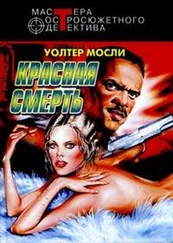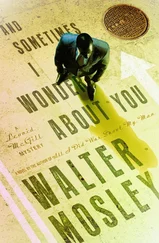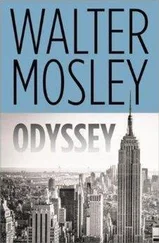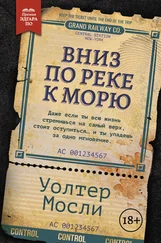After the Arbuckle closed Cornelius went to work.
From midnight to six the boy toiled. First he wrapped the hideous fetus in the smallest bag, packing chalky lime all around it. Using the handle of the lug-wrench as a lever he rolled the first bag into the second and the second into the third. When the sixth bag was zipped up CC levered Lorraine into the trunk, then glued that shut with epoxy. It took two hours for him to tumble the body back and forth, then maneuver it into the trunk. Then, for the last time, he closed the bookcase door using twenty-seven nails and more glue to ensure that it would never be opened again.
He made it home by eight in the morning. His father was asleep, ignorant of the fact that there was a murderer under his roof.
At night Cornelius dreamed about the corpse walled in the projection room closet. In the mornings he woke up thinking about his mother. Her parents didn’t know where she’d gone; neither did Timothy Michaels. Cornelius got Filo Manetti’s number from Michaels but it had been disconnected.
“I do not care where she has gone and neither should you,” Herman told his son. “She does not care about us.”
“But she’s my mom,” Cornelius said. “I love her.”
Herman, who had been looking away, turned to regard his son. His head wobbled a bit because of weakened neck muscles. There was pain behind the ex-sharecropper’s eyes. Pain, ten thousand poems and a million years of history.
“I love you too,” the boy said.
“You are the greatest event in my life,” Herman said. “Greater than my mother’s lullabies and my father’s homemade bamboo fishing poles. You are the blood of my blood and more.”
Cornelius knew this last word held deep meaning. More meant hundreds of hours reading history together; it meant their long talks and CC’s working at the Arbuckle to pay their bills. This one word was meant to repay him for a childhood of sacrifice. His father loved him, loved his being.
Herman was innocent. It was not his weakness that struck down Lorraine. Cornelius was the killer and he alone.
A few days later there was an article in the New York Post about Filo Manetti. He was named on a federal warrant. The government had an informant in the mob who had linked Lucia’s boyfriend to a conspiracy to commit murder. The gangster fled before the police could move in.
Fled, Cornelius thought, with my mother.
At the end of the first week the police came to the Arbuckle. When asked his name Cornelius told the police he was Herman Jones. They wanted to know if he had seen Chapman Lorraine.
“Not for months, officers,” Cornelius said.
Even though he was in the theater office on the lower floor Cornelius thought he caught a whiff of glue from the bookcase-door.
“When was the last time you saw him?” asked the senior detective, Colette Margolis.
“He didn’t like the place very much, ma’am,” Cornelius said. “He couldn’t sell it because it was a landmark building so, you know, he was kinda sour.”
“Did he have problems with anyone?” the detective asked.
“I didn’t really know him,” Cornelius replied.
“What about you?” she asked France Bickman.
“I haven’t seen Chapman in four months. The checks come in the mail and he don’t like the place too much like Herman here says. I really wish I could help you but we hardly know the man.”
The detective had amber eyes. Their beauty struck the teenage killer. Maybe he was staring a little too hard.
“You’re a little young aren’t you?” she asked and Cornelius wondered what she meant. The question must have shown on his face.
“To be working as a projectionist,” she explained.
“Oh. It’s after school and I can do my homework right here. You know all I have to do is change reels. It’s easy.”
She had brown skin like his. Her hair was a wavy brown.
The policewoman smiled. Her partner, a tall Hispanic man, nodded at Cornelius and then touched her shoulder.
“I guess we better be going,” she said. “We might come back if there are any other questions.”
“Come see one of our movies, Detective,” Cornelius offered. “When you watch them it’s like you’re living a hundred years ago.”
“Maybe I will,” she said.
Cornelius wished that the woman would return, but without a badge.
“The thesis is a police investigation,” Herman said when Cornelius told him about the detectives.
“The antithesis is animal attraction.”
Cornelius had decided to tell his father what was going on without telling him about the murder. He worried about the impact this knowledge would have.
“She’s a lot older than I am, dad, but I found myself wanting her to come back,” the boy said.
“But not in her role as a policewoman,” Herman added. “The only question is — what will be the synthesis of the heart’s investigation?”
That discussion was a rare moment of lucidity for Herman at that time.
Often Cornelius would come home to find his father in a confused state; the elder Jones sometimes didn’t know where he was. Cornelius would try to tell him that he was at home in his bed but that wasn’t enough. Herman would have to reenact the journey of his life up to the moment he was there in the room with the young man who called himself his son.
This pilgrimage took many different paths. Herman would, for instance, tell the story of a long and convoluted bus ride from his home in Columbus, Mississippi, through a life of deprivation and joy until the final stop in Brooklyn where he met Kendra Brooks, who later had an operation and became the seductress — Lucia, who made Herman into her man. The wordplay would bring a smile to the old man’s lips. He’d look up and recognize Cornelius sitting there beside him.
Cornelius continued to read to his father. When he was awake Herman loved the stories but rarely gave incisive interpretations of the uses of history. Late at night he’d wake up yelling for the conductor to stop the train.
“Why do you do it?” Herman asked one morning before Cornelius was off to school.
“What, dad?”
“Why do you make me come back to this?”
“You seem lost,” Cornelius explained, “scared.”
“But out there I’m having adventure. I got my legs and a big dick. The girls all like it fine.”
“You don’t want me to remind you that you’re here with me, dad?”
“Just be my friend, France. That’s all I need. Remember that we have to make sure my son has a pot to piss in when the curtain comes down.”
Detective Margolis returned to the Arbuckle on a Saturday evening three months after the disappearance of Chapman Lorraine. She came to watch movies. Between films she climbed the slender staircase and knocked on the projector room door.
“Hello, Detective,” Cornelius said.
“You remember me?”
“Detective Margolis. You gave France your card.”
“You can call me Colette,” she said. “I’m not on duty.”
She wore jeans and a short-short-sleeve pink blouse. Her thick hair was tied back. Deftly applied makeup made her amber eyes seem enormous. She was a few inches shorter than Cornelius but well-formed and strong.
“You were right about the movies,” Colette said. “It’s weird how everything in your life seems so far away. You really feel for the characters.”
She wasn’t forty, maybe not much past thirty, but he could see the hardness in her face when she stood close to him.
“You want to watch the next film from up here with me?” He wondered how the question managed to get out around the lump in his throat.
“That’d be great,” she said.
Читать дальше












